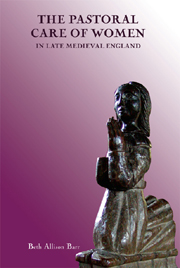Book contents
- Frontmatter
- Contents
- Miscellaneous Frontmatter
- Acknowledgments
- List of Abbreviations
- Introduction: “Be it husband, be it wife”
- 1 Pastoral Vernacular Literature
- 2 Pastoral Language
- 3 Pastoral Perceptions
- 4 Pastoral Care
- Conclusion: Gendered Lessons
- Appendix I The Manuscripts of Mirk's Festial
- Appendix II The Exampla of Mirk's Festial
- Bibliography
- Index
1 - Pastoral Vernacular Literature
Published online by Cambridge University Press: 12 September 2012
- Frontmatter
- Contents
- Miscellaneous Frontmatter
- Acknowledgments
- List of Abbreviations
- Introduction: “Be it husband, be it wife”
- 1 Pastoral Vernacular Literature
- 2 Pastoral Language
- 3 Pastoral Perceptions
- 4 Pastoral Care
- Conclusion: Gendered Lessons
- Appendix I The Manuscripts of Mirk's Festial
- Appendix II The Exampla of Mirk's Festial
- Bibliography
- Index
Summary
God says himself, as written we find,
That when the blind leads the blind,
Into the ditch they fall both,
For they see not whereby to go.
So act priests now-a-days;
They be so blind in god's law,
That when they should the people read [teach]
Into sin they do them lead.
Thus they have now done for a long time,
And all is for lack of knowledge.
Wherefore you parish priest,
If you [wish to] please your savior,
If you be not great [learned] clergyman,
Look [study] you must on this work;
For here you might find and read
That which behooves you to know;
How you shall [to] your parish preach,
And what you need them to teach,
And which you must yourself be,
Here also you might it see;
For little is worth your preaching,
If you be of evil living.
WITH THESE opening words, John Mirk made the intent of his Instructions for Parish Priests clear: to better educate priests – in their pastoral duties as well as their daily conduct – so that they could better educate parishioners. The author of Speculum Sacerdotal similarly stated that he had composed his work at the request of priests to help them preach and teach to their parishioners:
Therefore, you certain priests who are dear and familiar unto me before all others … that for the instance and prayers which that you have made unto me for this present work I have here disposed and written after my simpleness of the observance of all saints the which should worshipfully each Sunday be showed unto your people that God may be glorified in your churches by the matters written after, and devotion and knowledge of the people may be the more informed to worshipping and glorifying of him that is almighty … God.
- Type
- Chapter
- Information
- The Pastoral Care of Women in Late Medieval England , pp. 21 - 35Publisher: Boydell & BrewerPrint publication year: 2008



